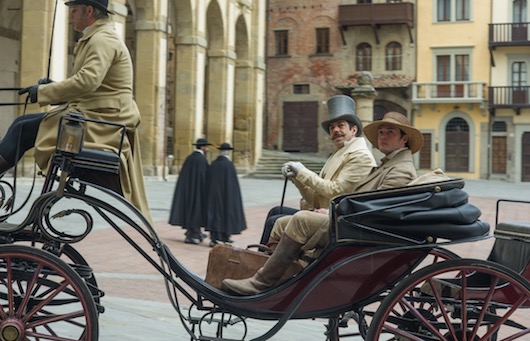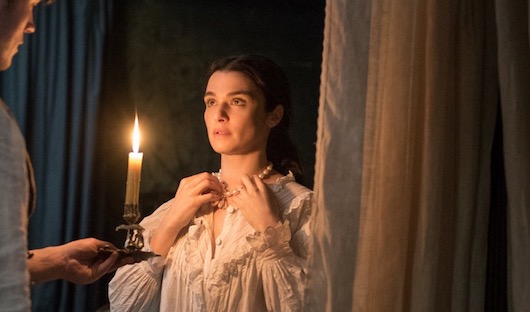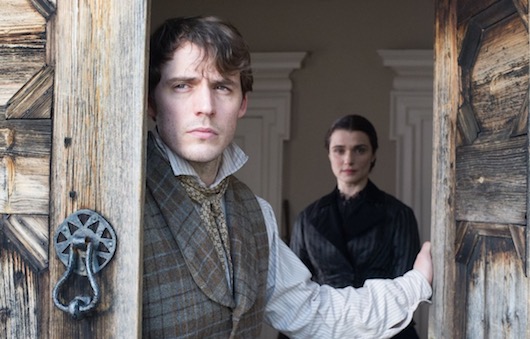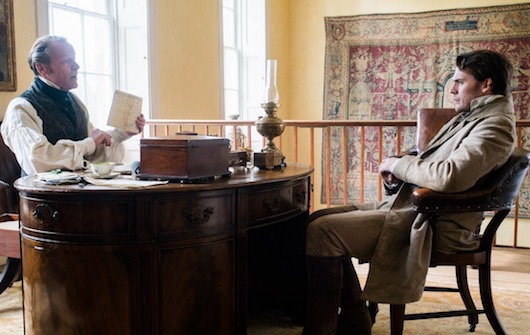 FILM
FILM In Which We Seriously Miss Megan Fox At This Time
 Friday, June 23, 2017 at 10:00AM
Friday, June 23, 2017 at 10:00AM 
Operation: Enduring Freedom
by ELEANOR MORROW
Transformers: The Last Knight
dir. Michael Bay
149 minutes
 There is a scene smack-dab in the middle of Transformers: The Last Knight where Cade Yeager (Mark Wahlberg) is sitting in a room opposite Oxford professor Viviane Wembley (Laura Haddock) for around two minutes. That is how long it takes for him to refer to her attire as "stripper-wear" because she was showing maybe an inch of her breasts. That no one has thought to arrest Michael Bay and put him in jail for this is a testament to the enduring freedoms possible in our country.
There is a scene smack-dab in the middle of Transformers: The Last Knight where Cade Yeager (Mark Wahlberg) is sitting in a room opposite Oxford professor Viviane Wembley (Laura Haddock) for around two minutes. That is how long it takes for him to refer to her attire as "stripper-wear" because she was showing maybe an inch of her breasts. That no one has thought to arrest Michael Bay and put him in jail for this is a testament to the enduring freedoms possible in our country.
In all other ways, Mr. Bay informs us at length, Dr. Wembley is a piece of shit. Even though she appears to be a tenured professor, she also gives tours at a local museum. She informs her tour group that the Knights of the Round Table probably never existed, which is quite the statement. Dr. Wembley is proved to be an academic fraud shortly after she was objectified by a man she did not even know. Subsequently, we learn her only purpose for being in the film is that she is the only one able to grip a long wooden shaft.

The rest of Transformers: The Last Knight makes a lot more sense, except the parts that don't. Take one subplot involving Seymour Simmons (John Turturro). Simmons appears in two scenes in Transformers: The Last Knight. Both of these scenes take place by telephone – Turturro literally got paid to stand next to a phone and talk to Anthony Hopkins for a few minutes. Why was he in Transformers: The Last Knight? I don't know, is it weird every single woman in these movies is a carbon copy of Megan Fox at different ages? Yes.
At the beginning of Transformers: The Last Knight, Cade Yeager finds a fifteen-year old Peruvian girl (Isabela Moner) in the wreckage surrounding Wrigley Field. He calls her "bro" and allows her to stay in his house. Much later, she hides aboard a dropship, unnoticed by a platoon of soldiers in order to follow Cade Yeager into the upper atmosphere. And that's it. That is her entire role in the movie. I don't know, is it weird that the way we are introduced to Dr. Wembley occurs when she careens into a bunch of bicycles with a car because she can't handle the challenges of an automobile?

In another scene, Anthony Hopkins is trying to evacuate an old Navy submarine that is held in a museum. He screams, "Get moving fat boy!" when one of the tourists does not vacate the premises as quickly as he would like. But why stop there? Why not just bring racial slurs back into vogue, Michael Bay? It certainly would have livened up the proceedings. Without ever having met Michael Bay, is it not terribly hard to conclude he is the dumbest piece of shit of all time. Transformers: The Last Knight features the long awaited return of the ghetto Transformer, who speaks in an African-American dialect siphoned from landmark films like Do the Right Thing and Scary Movie.

Cade Yeager and Dr. Wembley pilot a submarine into a ship buried off the coast of England. Although it is at the bottom of the ocean, there is no depressurization whatsoever as they return to the surface. I don't know why, but this bothered me more than anything else in Transformers: The Last Knight. The cast heads from underwater to Stonehenge, where they have learned the Earth's ancestral name was Unicron, and that the Earth's crust conceals a massive organism beneath the surface. Despite teasing this early on, Bay saves this plot development for a future movie he has promised not to direct.
The worst part of Transformers: The Last Knight, besides the lack of plot of any kind, is the humor. Since the characters have zero pre-existing relationships, it is painful to hear them joke with one another. Particularly cringe-worthy is a transforming butler voiced by Jim Carter responsible for the major comic relief. He is more like a physical manifestation of Michael Bay telling us what we should be laughing at in each scene of the movie. After Anthony Hopkins dies at Stonehenge, the butler explains that of all the lords he served, "you were by far the coolest." Michael Bay hasn't changed since the moment he walked out of The Goonies in 1985.
Eleanor Morrow is the senior contributor to This Recording.

 eleanor morrow,
eleanor morrow,  michael bay
michael bay 








































